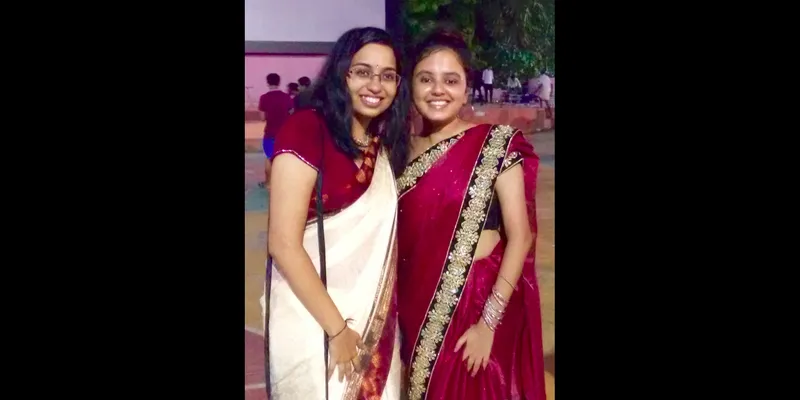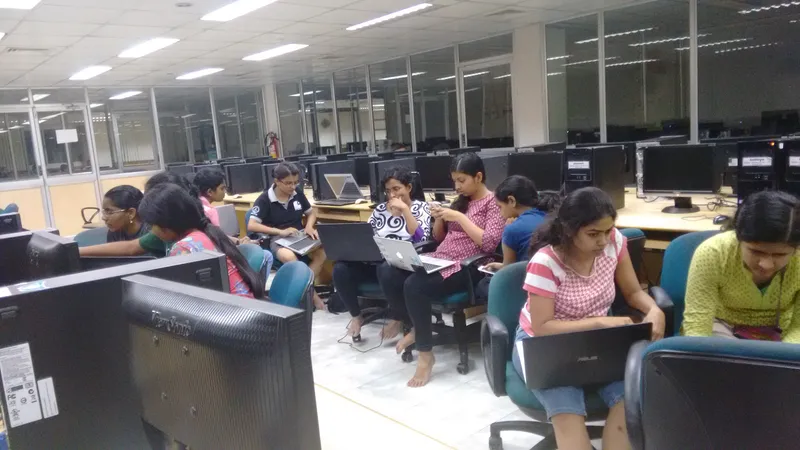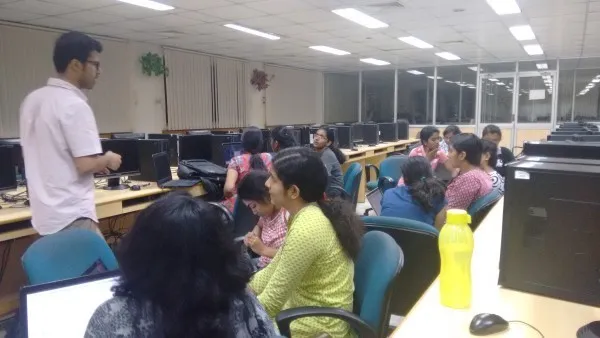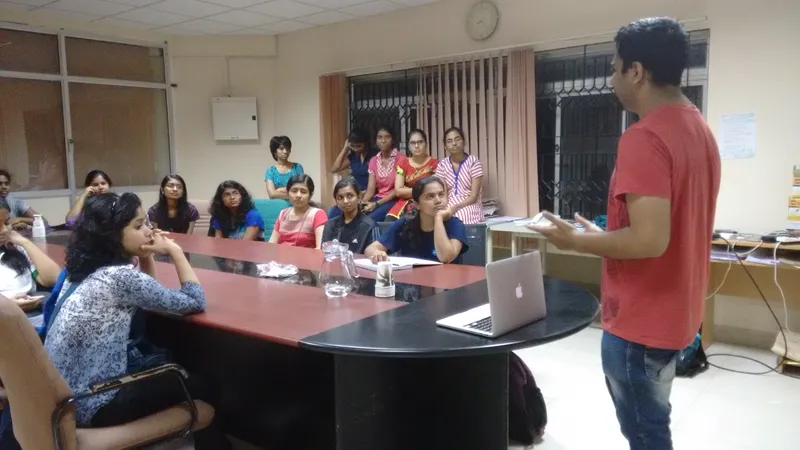

Two girls from IIT Madras share their story of how Google entrusted them with a mission
Women in Computer Science(WiCS) is an initiative funded by Google. The student organizers share their experiences.

Aditi and Pranali
The power of creation was bestowed upon her.
She has conquered mountains, swum across oceans, raised revolutionaries, walked with giants, led battalions, amassed golden cups, questioned norms with her political erudition, ran billion-dollar businesses, been crowned 'king' of the literary world, led fasts unto death, put Myanmar on the map, gracefully braved bullets for education,made tongues wag when she 'acted and adopted' her way to the London School of Economics..... And yet, the world is in doubt over her frail figure, squeaky voice and timid mannerisms.
The world has to be constantly reminded that there is more than what meets the eye.
Between when Harriet Beacher Stowe said, “Women are the real architects of society” and the quote that goes : “It's hard to be a woman. You must think like a man, act like a lady, look like a young girl, and work like a horse.”, what went wrong?
Today, I am here to talk about women in technology. The statistics glare at us!
In 2015, women held only 26% of all computing occupations, down from only 36% in 1991.
“Women aged between 25 to 34 are reporting greater dissatisfaction with their tech career prospects. These women cite unsupportive work environments, a lack of inspiring role models, and sacrifices in their personal lives that outweigh their personal gains.”
<https://www.ncwit.org/resources/women-it-facts-infographic-2015-update>
Hence, it is a problem that we have to tackle. Major organizations around the world have realized this truth and are doing their bit to counter the trend.
The people's favorite, Google has been taking pioneering steps for long.
This is where I stepped in to log the first-hand experience of two smart and intelligent girls chosen by Google to take forward their initiatives.
They are Pranali Yawalkar and Aditi Raghunathan, two girls who recently graduated from IIT Madras, India. Pranali is all set to join the software giant, Microsoft (Redmond, USA) as a Software Developer and Aditi has bagged an admission in the prestigious Stanford University for higher studies.
Both of them were winners of the prestigious 'Google Anita Borg Scholarship'. On their visit to the Google Office, they were entrusted with the task of starting a program in their college for encouraging the participation of women in technology.
As somebody who has attended these sessions, I can surely say that these girls have gone out of their way to make this program a success. It was evident that they translated their frustrations and hopes into the noble cause that this is.
Coming to the program , Women in Computer Science(WiCS) was split into five sessions.
First:The aim of the first session was to introduce the club to the participants and to get to know each other and the agenda of the club.
Second:The second session introduced the nuances of Open Source Development Programs to the group. It also briefed about GSoC, and 'Outreachy' programs, the application process and the perks of open source development.

The girls hard at work
Third:The third session was about research and higher studies in computer science. Attendees were introduced to the areas of research, application process, universities, and professors. It ended with a Q&A session.
Fourth:The fourth session was on Android App Development, which also included a hands-on session.
Fifth:The fifth and final session focused on competitive programming. This session was about how and where to start competitive programming and some initial concepts/tools that would allow one to plunge into solving online problems and contests.
Lastly, an online programming contest was held which witnessed enthusiastic participation from the girls. The winners were given Google goodies and T-shirts.
Here are some excerpts from the interview.

The boys were very enthusiastic to help out with the program . They fully appreciated the efforts being put in towards the cause.
Q : Tell me all about WiCS. Is this funded?
Aditi: WiCS is funded currently by Google. The way we are planning the activities is to try to use minimum resources for the activities.
The primary goal is to foster a sense of oneness and support system among women.
To this end, we were aiming at intro sessions and informal meetings.
Q:What do you think is the fundamental problem as to why there are fewer women in tech?
Aditi:There are several reasons. Some of them which seem glaring :
- Low critical mass →The fact that there are few women in CS makes women in general believe that it’s not suitable for them. It’s a negative reinforcement. Once we somehow cross the barrier and get a raise in the number of women in CS, the numbers will automatically start increasing after that.
- Low exposure to tech at young ages: Parents tend to focus tech resources on boys more than girls. This systematic discouragement makes fewer women have the opportunity to be excited by CS
- Societal Biases : Even when some women bear the odds and take up tech jobs, they are perceived to be less capable and this reflects in the pay, promotions etc. There is definitely a glass ceiling phenomenon.
Pranali:Also, girls have a lot of inhibitions. They are worried about whether they will be able to make a mark while working alongside men. And, what would happen if they were to get married and have kids?
There is a general tendency among women to limit themselves. They do not aim higher. They stop dreaming once they get a job.
This is where we should learn from the guys. They aim very high. Also, we should learn to showcase our talent. Girls tend to be very submissive, meaning their contribution is not recognized among their peers.
Q:Did you face any challenges?
Pranali:Generally, people underestimate the number of hours to be put in. But, what they don't realize is that the bonding that is created from such activities goes a long way in the journey ahead. If you look at the boys, they would have formed a good support system among themselves, resulting in better participation in competitions and exhibitions.
Q: Who is your role model?
Pranali:My mother. She is a very bright woman who is a triple MA. She is a lecturer. She used to come home and work very hard for her degree besides managing the household and college work. And my dad was very supportive. Be it monetary help or mental support. In fact, he was the driving force. He saw the potential in her and always backed her. We need more men like that.
I just loved her answer!

The boys were very enthusiastic to help out with the program . They fully appreciated the efforts being put in towards the cause.
Q:Have you faced any stereotypes?
Aditi:I think the worst that I’ve seen is that people think things are easier to accomplish because I am a girl when the actual fact is that it’s the opposite.
Pranali: Generally, there is a mindset that a girl achieved something only because of her gender.Many women exhibit the impostor syndrome where people think they got what they got because of luck.
Q:How do you think these STEREOTYPES can be broken?
Aditi:Having more successful women!
Q:Why do you think there are fewer women who reach IIT's after 12th?
Aditi:fewer women in coaching classes. IIT needs dedicated preparation and very few women have access to it.
Q:Do you think there should be any women oriented policies at workplaces?If yes, what are they?
Pranali:There should be a provision for part-time jobs. Because, when I reach a stage where I have to devote time to my family, I would like to opt for more flexible options. I wouldn't mind lesser pay. But, this has to be implemented wisely, or else, people may take advantage of it.
Aditi:
-Sufficient maternity leave
- Support for moms with young kids : Maternity rooms etc.
- Active check against biases : When women aren’t promoted, there has to be a clear assessment (by a committee with men + women) about whether the decision was biased.
Q:Have you thought of taking forward this body of work to your next destination? If yes, what ideas do you have? If no, why not?
Pranali:Microsoft is already involved in many social causes. While I was interning there [India office], we went to a slum area and interacted with the girls. We told them about the world outside, and the plethora of opportunities awaiting them.I would love to be a part of such causes in the United States too..
Aditi: We will be providing external support to the WiCS team. And yes, wherever I am, I want to work for the betterment of women's place in tech. Just like Pranali said.
Q:How do you see the future of WiCS? What qualities are you looking for in people to take this forward?
Pranali: We needed a leader. Somebody who had the ability to make others take notice and believe in them. Somebody who is ready to put in an adequate number of hours backstage. The leader should be the role model for the entire team.
Q:Which other communities/groups do you look up to?
Aditi & Pranali:
Women in ML
Stanford WiCS
Women who code
Q:Is there anything, if given a chance, you would go back and change about WiCS?
Aditi & Pranali: We should have started this a LOT earlier!
Q:Being accomplished students, what tips do you have for the young and aspiring girls? Any 3 pieces of advice.
Aditi:
-Do not fear to aim for what you desire
-Don’t be afraid to seek out help. Seeking help only makes you stronger than before.
-Actively mitigate ‘Imposter Syndrome’ feelings.
Pranali:
Like I said earlier, women should learn to showcase their talents. This is a game changer. When we start appreciating ourselves, the world will take notice and in turn appreciate us.
We should also aim higher and not become stagnant once we get a job.
Q: Would you like to share any inspiring incidents from your journey so far?
Pranali: When I went to Shanghai, I was inspired by the girls I saw there. Before that, I just saw myself becoming a homemaker in my late twenties. But, these girls... they were from Australia, Korea etc. They were talking about science and medical problems and the huge projects they were working on. They were managing both career and family life.
This incident inspired me to dream bigger. Seeing them, I too realized that it is possible to have a balanced life. I too want to be a part of all the great work that is going on in the world right now!
Aditi: When I heard people telling me how they look up to Pranali and me and really appreciate our efforts, I realized that just a small amount of our time and energy was able to make a difference to people. I felt more encouraged to take up activities that aim at inclusion: not just women, but other minorities or disadvantaged communities.
We have a long way to go. But, women cannot achieve equality alone. Men should be our role models. They should be a part of this as much as the women.
“A human being is a part of the whole called by us the 'Universe', a part limited in time and space. He experiences himself, his thoughts and feeling as something separated from the rest, a kind of optical delusion of his consciousness. This delusion is a kind of prison for us, restricting us to our personal desires and to affection for a few persons nearest to us. Our task must be to free ourselves from this prison by widening our circle of compassion” - Albert Einstein
Don't miss the below TED talk!
Reference:
1) 26th June, 2016
<https://www.ncwit.org/resources/women-it-facts-infographic-2015-update>
2) TED (2015, August). Elizabeth Nyamayaro: An invitation to men who want a better world for women [Video file].
Retrieved from https://www.youtube.com/watch?v=VekRvcbL4yk






